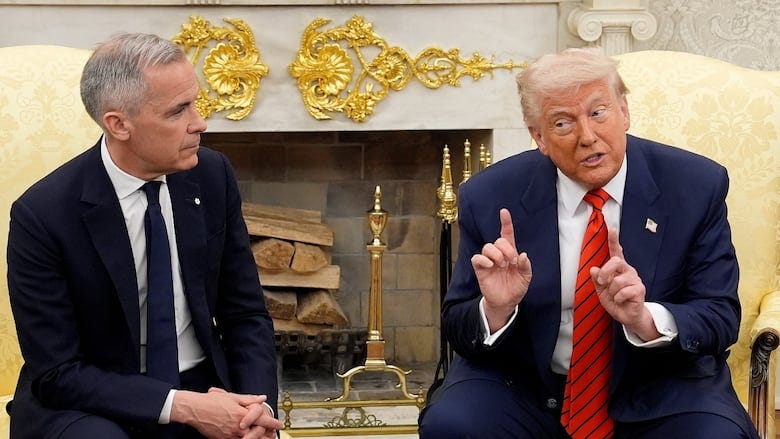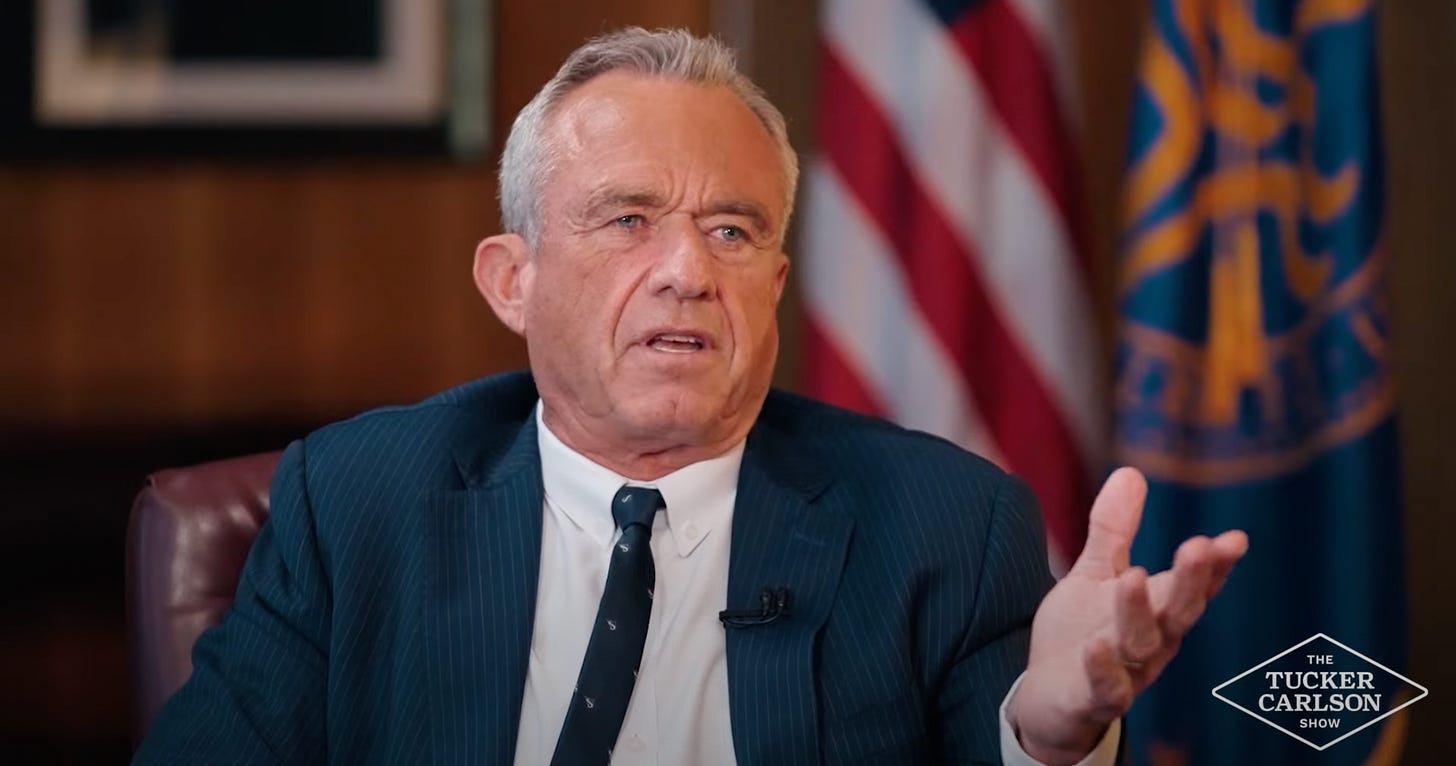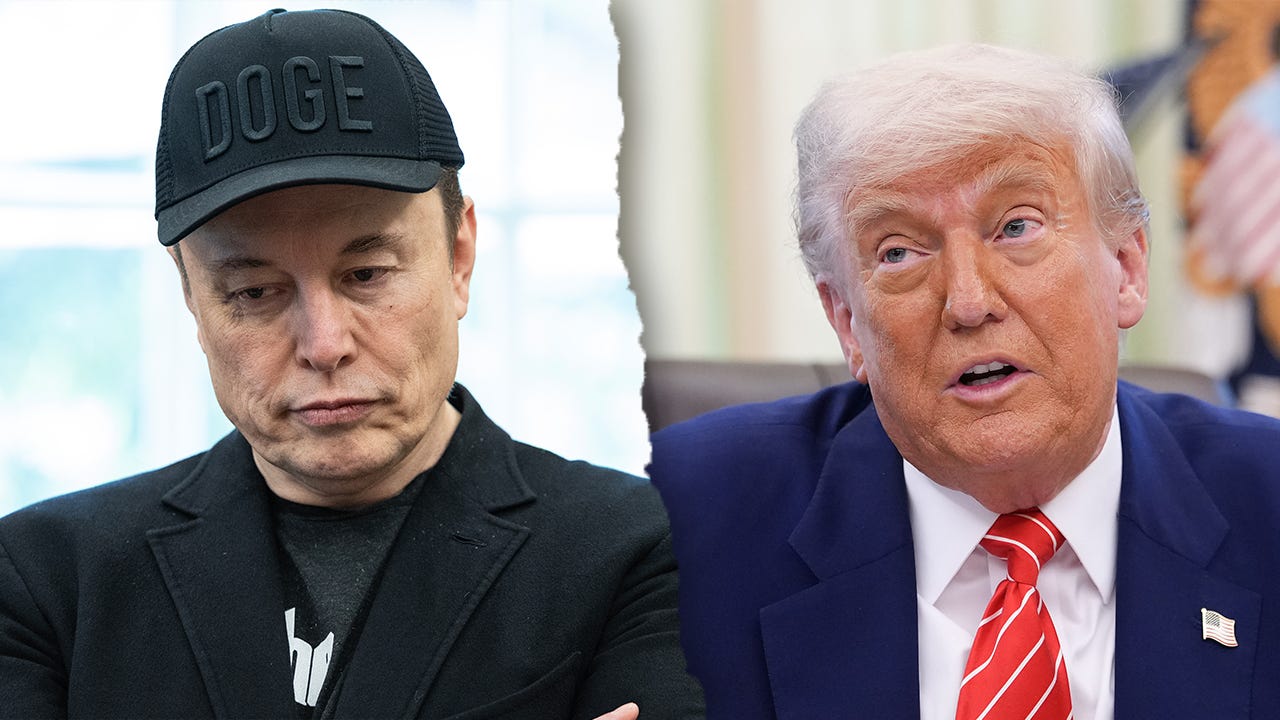Good morning, it’s Wednesday, July 2nd. In today’s news, Trump killed Canada’s Digital Services Tax—is Supply Management next? Senate passes megabill with Vance casting tie-breaker, RFK Jr. alleges CDC buried link between vaccines and autism, Israel agrees to 60-day Gaza cease-fire, and much more.
First time reading the Daily Blend? Sign up here.
Trump Killed the Digital Tax: Is Supply Management Next?
When Mark Carney caved on Canada’s Digital Services Tax, it was a clear signal that the new Liberal government is playing defence in trade talks with Donald Trump. Just days after Trump threatened to pull out of negotiations over the DST — a retroactive tax targeting U.S. tech giants like Amazon, Meta, and Google — Carney folded, scrapping the policy entirely. The Canadian Chamber of Commerce cheered, the White House relaxed, and trade talks resumed. But now, the real fight may be just beginning.
Over the weekend, Trump zeroed in on a much bigger target: supply management — the protectionist system that shields Canada’s dairy, poultry, and egg industries through quotas and sky-high tariffs. This isn’t a new gripe. Trump railed against it during the original NAFTA renegotiations, and U.S. lawmakers have continued to demand its dismantling ever since. The difference now? Trump has leverage — and Carney has already shown his willingness to back down.
Killing the DST cost the Liberals little politically. But supply management is a different beast. It’s a sacred cow in Quebec, literally and figuratively. Even a modest reform has ended political careers, as Maxime Bernier found out in 2017 when the dairy lobby helped tank his Conservative leadership bid. With Carney’s minority government relying heavily on Bloc Québécois support — and with a recent all-party bill passed to “protect” supply management — the political cost of touching it is enormous.
But the economic cost of leaving it in place is just as severe. Canadians pay inflated prices for basic staples like milk and eggs while new farmers are priced out of the market entirely. According to both the Montreal Economic Institute and Macdonald-Laurier Institute, it’s a rigged system that benefits a handful of entrenched producers while penalizing low-income families and killing innovation.
Now Carney faces a test of leadership. Trump will likely say that if Canada wants access to critical trade deals — on autos, steel, aluminum, and critical minerals — the price will be supply management. Will Carney hold the line for a policy that benefits a few at the expense of many? Or will he fold to preserve goodwill with Washington? Source.
Senate Passes Megabill With Vance Casting Tie-Breaker
In a dramatic midday vote on July 1, the Senate passed the One Big Beautiful Bill Act after a marathon “vote-a-rama” that began the day before and ran through the night. The chamber was split 50–50 until Vice President JD Vance cast the deciding vote, handing President Trump a major legislative victory.
Tight Vote Reflects GOP Divisions
The final vote exposed deep fractures within the Republican caucus. Senators Rand Paul (R-KY), Thom Tillis (R-NC), and Susan Collins (R-ME) voted against the bill. Others, like Rick Scott, Josh Hawley, Lisa Murkowski, and Ron Johnson, expressed strong reservations but ultimately voted yes.
Moderates were concerned about steep cuts to Medicaid, while fiscal conservatives argued the bill didn’t go far enough to reduce spending. Senate Majority Leader John Thune worked through the night to broker compromises, including increasing funding for rural hospitals and tweaking Medicaid provisions to win over holdouts.
What’s in the Bill
The 940-page bill includes key planks of Trump’s second-term agenda:
Extension of the 2017 Trump tax cuts
Elimination of federal taxes on tips and overtime
Tougher border security funding
Repeal of green energy tax credits
New 80-hour/month work requirements for Medicaid recipients
A $50 billion stabilization fund for rural hospitals
The legislation also raises the debt ceiling by $5 trillion, a move that drew fierce opposition from some Republicans. Senator Rand Paul demanded that the debt ceiling provision be stripped and voted on separately, warning of long-term fiscal damage.
Trump’s Personal Involvement
President Trump was directly involved in securing the bill’s passage. He personally called senators to whip votes and posted on social media afterward, declaring, “It is no longer a ‘House Bill’ or a ‘Senate Bill.’ It is everyone’s Bill.” Trump also urged House Republicans to unite and get it passed before the July 4 holiday: “Let’s keep it going, and be done before you and your family go on a July 4th vacation.”
Criticism and Fallout
Democrats condemned the bill, calling it a giveaway to the wealthy that guts Medicaid and food assistance. Senate Minority Leader Chuck Schumer warned that Republicans would regret the vote, stating, “This is not what the American people want.”
Fiscal hawks outside of Congress also took aim. Elon Musk vowed on X to fund primary challengers against any Republican who voted for the bill, calling it “the biggest debt increase in history” and a betrayal of conservative promises.
Heading to the House
The bill now moves to the House, where Speaker Mike Johnson faces the challenge of uniting a slim Republican majority. He expressed optimism but stopped short of guaranteeing passage by July 4. Moderate Republicans from swing districts may object to Medicaid cuts, while hardliners in the Freedom Caucus are already raising alarms about the bill’s $3.25 trillion projected deficit increase, as calculated by the Congressional Budget Office.
Discontent is also brewing over the Senate’s removal of certain provisions, such as the excise tax on Chinese wind and solar imports, and the inclusion of the Grassley–Ernst–Murkowski amendment, which some conservatives say violates the House’s original budget framework.
The Road Ahead
The House is scheduled to vote on July 2. The passage would mark a significant win for Trump. If passed, the bill will reshape tax policy, social programs, and spending priorities heading into the second half of Trump’s term—and likely shape the 2026 midterm battles as well.
RFK Jr. Alleges CDC Buried Link Between Vaccines and Autism
In a recent appearance on Tucker Carlson Uncensored, Robert F. Kennedy Jr. reiterated a claim that has long placed him at odds with the medical establishment: that the Centers for Disease Control and Prevention (CDC) knowingly concealed evidence of a potential link between vaccines and autism.
According to Kennedy, the CDC conducted a study in 1999 to assess the health outcomes of vaccinated versus unvaccinated children, focusing specifically on the hepatitis B vaccine administered in the first 30 days of life. The study, led by Belgian researcher Thomas Verstraeten, reportedly found a staggering 11,135% increased risk of autism in children who received the vaccine early compared to those who received it later or not at all.
Kennedy alleges that the results “shocked” CDC officials and were subsequently buried through repeated reworking of the data. He claims the study went through five separate iterations, each designed to dilute or obscure the original findings. Among the tactics used, according to Kennedy, were excluding older children who had already been diagnosed with autism and re-stratifying the data to render it statistically meaningless.
“These were not mere academic adjustments,” Kennedy argued. “They were deliberate acts to conceal a dangerous signal.”
The CDC has long denied any causal link between vaccines and autism, citing extensive research from numerous international studies. The Verstraeten study in question was eventually published in 2003 with no mention of an autism risk, and mainstream scientists have since dismissed Kennedy’s interpretation as misleading. Critics point out that the original findings may have reflected statistical noise rather than genuine causation, and that subsequent research has failed to replicate such an extreme correlation.
Still, Kennedy’s allegations speak to a broader concern many people share: distrust in public health institutions. The public appetite for transparency in health research has grown—particularly in the wake of COVID-19 and revelations of government overreach, censorship, and pharmaceutical lobbying.
For supporters, RFK Jr.’s persistence represents a courageous fight against institutional corruption. For detractors, it’s dangerous misinformation. Either way, the debate surrounding vaccine safety, scientific integrity, and government transparency is far from over—and likely to intensify as Kennedy continues his presidential campaign. Source.
Israel Agrees to 60-Day Gaza Cease-Fire—The Deal ‘Will Not Get Better’
President Trump announced that Israel has agreed to a proposed 60-day cease-fire in Gaza, pending Hamas’s acceptance. The deal, brokered with help from Qatar and Egypt, aims to end the war and secure the release of remaining hostages. Trump warned Hamas that the offer “will not get better.” The announcement came as top Israeli officials met with US leaders in Washington. Meanwhile, tensions remain high following new attacks from Gaza and Yemen, and Israel confirmed the killing of a top Hamas commander linked to the October 7 massacre. More
FBI Uncovered the ‘Largest Health Care Fraud’ in American History
The FBI and DOJ have charged 324 people, including 96 doctors, nurses, and pharmacists, in what they’re calling the largest healthcare fraud case in US history, with nearly $15 billion in reported losses.
The scheme spanned 50 federal districts and involved transnational crime rings that used stolen identities and even AI-generated recordings to fake patient consent for Medicare claims. Some defendants allegedly bought dozens of US medical supply companies to push $10.6 billion in fraudulent billing.
Federal agents also made arrests at airports, the US–Mexico border, and overseas in Estonia, highlighting the global scope of the fraud. Officials say this is part of an escalating crackdown on corruption in the American healthcare system. More
WHO Continues Running Cover for China as Recent Report Says COVID Origins Uncertain - The WHO director-general said both zoonotic spillover and lab leak hypotheses ’must remain on the table' and urged Beijing to share data. More
European Union Says Tech Laws ‘Off the Table’ in US Trade Talks - The Trump administration has strongly criticized both the Digital Services Act and the Digital Markets Act, arguing they unfairly target and penalize U.S. tech companies. More
Denmark Begins Drafting Women as Russian Threat Looms--Women to Face Conscription by Lottery - More
Turkish Police Detain Four Journalists Over Alleged 'Prophet Mohammed' Cartoon That Sparked an Angry Mob - More
Cartel Violence in Sinaloa, Mexico, Leaves 20 Dead, Including 4 Decapitated Bodies - More
Tesla Shares Tumble After Trump Says DOGE Should Look at Elon Musk’s Subsidies
Tesla shares dropped over 5% after President Trump called for cutting subsidies to Elon Musk’s companies, suggesting Musk would “have to close up shop” without them. Trump criticized Musk for opposing the GOP tax bill and said the Department of Government Efficiency (DOGE) should investigate. Musk, once Trump’s top donor, fired back online, saying, “CUT IT ALL,” accusing Republicans of abandoning clean energy leadership and calling for a new “America Party” if the bill passes. The feud reignites tensions between the two billionaires and raises uncertainty over Tesla, SpaceX, and Starlink’s reliance on government support. More
Mark Zuckerberg Announces His AI ‘Superintelligence’ Supergroup - Former Scale AI CEO Alexandr Wang, who joined Meta as part of a multibillion-dollar deal earlier this month, will head up the group as the company’s chief AI officer. More
Amazon Launches a New AI Foundation Model to Power its Robotic Fleet and Deploys its 1 Millionth Robot - More
Home Depot Wins Bidding War to Buy GMS for $4.3 Billion - Including debt, the transaction is valued at about $5.5 billion. GMS operates a network of over 320 distribution centers, specializing in products like drywall, ceilings, and steel framing, primarily serving residential and commercial contractors. More
‘Magic Mushrooms’ Show Long-Term Relief for Cancer-Related Depression
A new phase 2 clinical trial shows that a single 25 mg dose of psilocybin (the active ingredient in ‘magic mushrooms’), combined with therapeutic support, led to lasting reductions in depression and anxiety in cancer patients, up to two years later. Over 50% of participants saw significant improvement, and ongoing trials are now testing whether multiple doses could help even more patients achieve remission. Researchers say psilocybin shows strong promise as a long-term mental health treatment for those battling cancer. More
Scientists Discover Key Protein Behind Exercise’s Anti-Aging Power - The myokine CLCF1, which declines with age but is released during exercise and helps protect against musculoskeletal aging. More
The Next Unicorn? Switch Pitcher Headed to MLB All-Star Futures Game
Jurrangelo Cijntje, a 2024 first-round pick by the Seattle Mariners, is set to appear in the 2025 MLB All-Star Futures Game on July 12 in Atlanta—and he may be the most unique player on the field. The 22-year-old switch pitcher throws with both arms, making him just the second switch pitcher in over 100 years.
In his first pro season with the High-A Everett AquaSox, he’s 4–4 with a 4.88 ERA, averaging over a strikeout per inning. He’s been more dominant pitching from the right side, limiting hitters to a .165 average with a fastball around 96 mph. As a lefty, his velocity drops, but he compensates with a heavy sinker that effectively induces ground balls, though he’s still working on his command and consistency. More
UPenn and the Trump Admin Reach Deal to Strip Transgender Swimmer of Past Titles and Awards - It must also make a personal, written apology to every female swimmer who competed against the transgender athlete, Lia Thomas. More
Maple Leafs Trading Mitch Marner's Rights to Golden Knights Ahead of Free Agency - In a sign-and-trade deal, Marner has reportedly signed an 8-year, $96 million deal with Toronto and will be heading to Vegas. More
WNBA Expansion Lands New Franchises in Cleveland, Detroit, and Philadelphia - The WNBA will have 18 teams by the 2030 season, marking a 50 percent increase from the 12 teams that were in place in the 2024 WNBA season. More
Shai Gilgeous-Alexander Agrees to 4-Year, $285 Million Supermax Contract Extension with Thunder - More
The World's Longest Waiting List? It'll Take You 100 Years to Obtain a Canada Flag That Has Flown in Parliament
7 Indian Engineers Suspended Over $2.3 Million Bridge with 90-Degree Turn
On this day in 1823, Brazil secured its independence in Bahia, as Portuguese crown loyalists were finally defeated, marking the end of Portuguese rule in the region and a decisive victory in Brazil's fight for sovereignty.



















Well written.
Better than podcast, which is more casual and usage of foul language. Too bad. It is nice to get ahead with podcasts
Since we’re all about objective fact let’s see the comparison of prices between dairy and eggs Canada vs US from central states not 10 miles across the border. The fact our dollar is shit is gonna make our price higher in Canada more than what everyone thinks that supply management restricts supply. If you seen how much work goes into planning to make sure demand is always met you would be surprised. Also not sure if you guys have any idea how bad the US industry is. If you want to kill more GDP that will make a huge dent in a lot of rural economies. With the regulatory bs to get anything built here is double the price of US. They’ll drown the market and then in 6 months complain that they didn’t get enough cause they just overproduced more